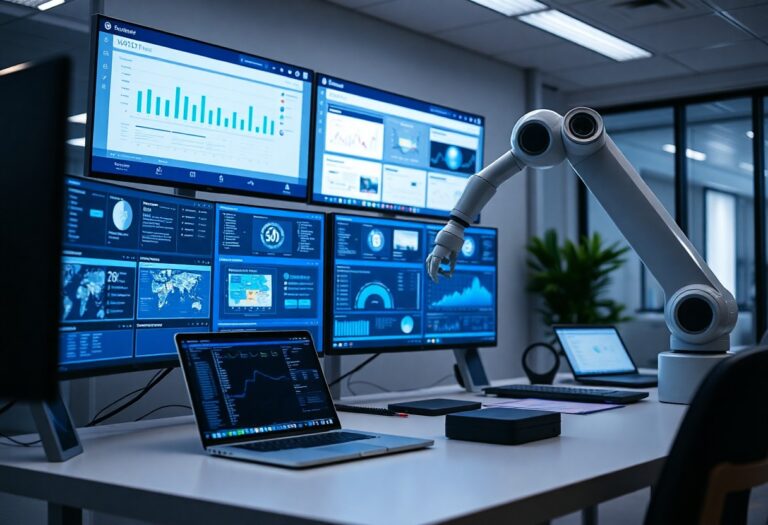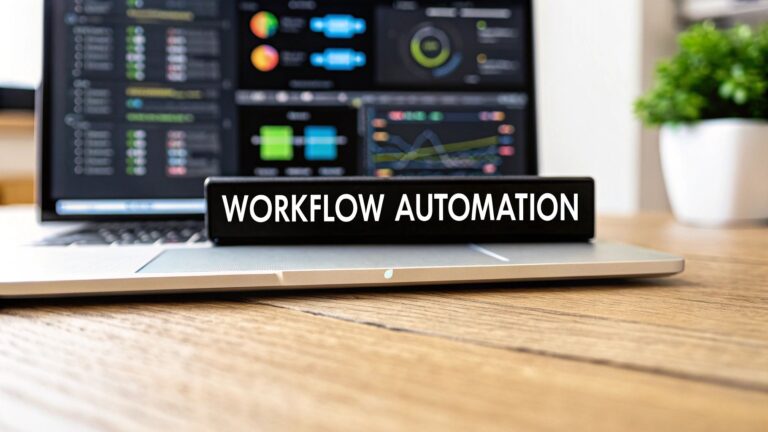AI Automation Agency
AI technology is revolutionizing how businesses operate, and an AI Automation Agency can help you harness these innovations effectively. By streamlining your workflows and automating repetitive tasks, these agencies enable you to focus on strategic decisions that drive growth. While there are potential risks associated with automation, such as job displacement or security concerns, the positive impacts—like increased efficiency and cost reduction—far outweigh the negatives when managed responsibly. If you’re looking to stay competitive in a rapidly evolving market, partnering with an AI Automation Agency could be your best move.
Key Takeaways:
- Efficiency: AI Automation Agency enhances operational efficiency by automating repetitive tasks, allowing businesses to focus on core activities.
- Scalability: The agency offers scalable solutions that can adapt to the growing needs of a business, ensuring long-term sustainability and growth.
- Cost Savings: Implementing AI solutions can lead to significant cost reductions, optimizing resource allocation and minimizing human error.
Understanding AI Automation
While the landscape of technology continues to evolve at an unprecedented rate, understanding AI automation has become important for businesses and individuals alike. This paradigm encompasses the use of artificial intelligence to perform tasks that typically require human intelligence, integrating tasks to enhance productivity and efficiency. As you explore this field, it’s vital to comprehend how AI can streamline operations and improve decision-making processes across various sectors.
Definition of AI Automation
After you’ve grasped the basic principles of AI, you’ll find that AI automation refers to the systematic employment of artificial intelligence technologies to automate complex, repetitive tasks traditionally handled by humans. This can include everything from data entry and analysis to customer interaction and process management. By implementing AI automation, organizations can experience significant improvements in efficiency, cost reduction, and the ability to reallocate human resources to more strategic initiatives.
Types of AI Automation Technologies
After diving deeper, you will encounter various types of AI automation technologies that help shape the future of work. Below is a summary of five key technologies:
| Technology | Description |
| Robotic Process Automation (RPA) | Automates rule-based tasks through software bots. |
| Machine Learning (ML) | Enables systems to learn from data and improve over time. |
| Natural Language Processing (NLP) | Facilitates communication between humans and machines. |
| Computer Vision | Enables machines to interpret visual information. |
| Chatbots | Automate customer service and support inquiries. |
Types of AI automation technologies can be categorized into various forms, each identifiable by their unique characteristics designed to optimize specific functions. Understanding these technologies enables you to align the best suited solutions with your organizational needs and aspirations. Here’s a more detailed view in tabular format:
| Type | Key Features |
| RPA | Ideal for automating repetitive tasks without human intervention. |
| ML | Allows systems to analyze large datasets to predict outcomes. |
| NLP | Enhances user interaction through natural language understanding. |
| Computer Vision | Utilizes image processing to perform task-specific analyses. |
| Chatbots | Facilitates real-time customer engagement and support. |
As you investigate deeper into the types of AI automation technologies, it’s important to note that each technology can offer distinct advantages for your organization. For instance, computer vision can automate quality control in manufacturing, while RPA can streamline administrative processes. Adopting the right AI tools enables you to improve operational standards significantly and develop more efficient workflows.
- Robotic Process Automation (RPA)
- Machine Learning (ML)
- Natural Language Processing (NLP)
- Computer Vision
- Chatbots
Recognizing the potential of these technologies will equip you to harness the full power of AI automation in your business operations.

Benefits of AI Automation
Some of the benefits of AI automation are profound, particularly in terms of enhancing your business operations. When you implement automation tools, you can streamline processes that once took significant time and resources. This allows you and your team to focus on more strategic tasks that drive growth and innovation. Organizations that engage with a Top AI Automation Agency can expect to see rapid improvements in efficiency as automated systems handle repetitive tasks seamlessly.
Increased Efficiency and Productivity
Increased productivity is one of the standout advantages you’ll encounter when you integrate AI into your workflows. By automating mundane tasks, you free up valuable time that can be better spent on high-impact activities. This reallocation of resources not only boosts your output but also enhances the quality of your work, as team members can devote their attention to areas that require critical thinking and creativity.
Streamline Your Business with Cutting-Edge Automation
Empower your business with powerful automation tools designed to enhance workflows, improve efficiency, and drive online impact.
Book a CallCost Reduction and Resource Optimization
To maximize profits and maintain competitive advantage, understanding the cost-saving potential of AI automation is critical. By automating tasks, you reduce the need for excess manpower and minimize human error, both of which translate to significant cost savings. This efficiency allows your business to allocate resources more effectively, ensuring that your investments yield the best possible returns.
But keep in mind that these savings extend beyond just labor costs. Leveraging AI can also minimize wastage and improve your resource allocation. Automated systems often provide insights that humans may overlook, enabling you to make data-driven decisions that support sustainable growth. Ultimately, these optimizations can lead to a healthier bottom line and a stronger foundation for your future endeavors.

Challenges and Considerations
To successfully navigate the world of AI automation, you need to be aware of the various challenges and considerations that come with implementing such technologies. The landscape is complex, and organizations often face problems relating to the integration of AI systems into existing workflows. Resistance from employees can be a significant hurdle, as many people fear that automation might replace their jobs. Additionally, there may be issues with the compatibility of AI solutions with your current technology stack, creating tensions between your goals and the reality of what’s possible. You should also consider how you manage the data required for AI systems, as poor data quality can lead to ineffective automation.
Implementation Hurdles
Challenges arise at various stages of implementing AI automation. One of the initial roadblocks is understanding the specific needs of your business, which can be challenging amidst a sea of rapidly evolving AI technologies. Without a clear strategy that defines your objectives, you might find it overwhelming to select the right tools and platforms. Moreover, the cost associated with deploying AI solutions can be daunting. Budget constraints can limit your ability to hire the necessary talent or purchase the needed resources, which can stall progress.
Ethical Implications
Hurdles associated with the ethical implications of AI automation cannot be overlooked. As you increasingly rely on machine learning algorithms, you must address concerns about data privacy, security, and inherent biases in the algorithms. Questions relating to who is accountable when things go wrong also emerge, emphasizing the need for you to establish clear guidelines that ensure responsible AI usage. Neglecting these ethical considerations could lead to harmful repercussions, including public backlash and potential legal issues.
Hence, the importance of embedding ethical frameworks into your AI strategies should not be underestimated. By actively fostering transparency in your AI processes, you can cultivate trust among your stakeholders. Addressing data privacy and being vigilant about algorithmic biases not only safeguards your business’s reputation but also fosters inclusivity and fairness in technology deployment. By prioritizing these ethical dimensions, you can create a sustainable environment where AI automation truly benefits both you and your community.

Industries Impacted by AI Automation
Keep in mind that AI automation is reshaping various industries, providing opportunities and challenges alike. The integration of AI technologies has significantly altered the operational frameworks, mainly focusing on enhancing efficiencies and lowering costs. You may find that these changes are especially prevalent in manufacturing, where the use of AI-driven systems and robotics has improved production processes and quality control. This transformation enables manufacturers to have greater control over their production lines, leading to quicker turnaround times and reduced human error.
Manufacturing
About the manufacturing industry, you can observe how AI is streamlining processes, from supply chain management to predictive maintenance. It’s not uncommon for advanced algorithms to analyze data in real time, allowing businesses to anticipate equipment failures before they occur, thereby minimizing downtime and reducing operational costs. Furthermore, robotics and automation systems can handle repetitive tasks, freeing workers for more critical thinking roles, ultimately boosting productivity.
Services and Logistics
By leveraging AI technologies, the services and logistics sectors are experiencing a wave of innovation that enhances customer experiences and improves operational efficiencies. Automated systems are being integrated into warehouses, enabling real-time inventory tracking and optimizing delivery routes through data-driven insights. This not only speeds up the order fulfillment process but also streamlines the overall supply chain, providing you with better service and reliability.
Another significant aspect of the AI impact within services and logistics is the ability to analyze vast amounts of data for strategic decision-making. As businesses collect and analyze customer behavior data, AI can help you personalize services, offer tailored recommendations, and optimize inventory levels. This results in enhanced customer satisfaction and improved profitability, positioning your organization favorably in a competitive landscape. However, it’s crucial to be aware of potential workforce shifts, as increased automation may lead to reduced demand for certain roles, demanding you to manage this change carefully.
The Role of an AI Automation Agency
Not every business has the internal resources or expertise to harness the power of AI automation effectively. This is where an AI Automation Agency comes into play, acting as a bridge between your operational needs and the infinite possibilities that artificial intelligence offers. By partnering with an agency, you can leverage their specialized knowledge to streamline your processes, improve productivity, and drive innovation without the steep learning curve. For a comprehensive guide on how to set this up, refer to this article on How To Start An AI Automation Agency In 7 Days [Step by …].
In your journey toward automation, an AI Automation Agency not only aids in implementation but also provides ongoing support, making adjustments based on performance data and feedback. This ensures that the solutions you adopt are not only effective but also aligned with your business goals. Through the integration of AI-based tools, you could start to see improvements in efficiency, scalability, and a substantial return on investment.
Services Offered
On the spectrum of services that an AI Automation Agency can provide, you will find a range of tailored solutions designed to meet specific business needs. This includes consulting services, where experts analyze your current workflows and suggest appropriate AI tools to enhance efficiency. Additionally, agencies often specialize in custom software development, creating unique solutions that integrate seamlessly with your existing systems. Other services may involve training & support to upskill your team on new tools or techniques, ensuring that everyone is equipped to maximize the benefits of automation.
Moreover, your partnership with an AI Automation Agency can encompass data analysis services, where advanced algorithms are employed to derive insights from your existing data, allowing you to make informed decisions. As you explore these services, you’ll discover that the right agency can furnish you with a comprehensive package that takes care of everything from strategy formulation to execution.
Case Studies and Success Stories
Above all, the effectiveness of an AI Automation Agency is best illustrated through its case studies and success stories. These case studies provide real-world examples of how companies, similar to yours, have successfully implemented AI solutions, leading to quantifiable outcomes. Here’s a list of some compelling success stories:
- Retail Company X: Achieved a 25% increase in sales over six months after adopting AI automated customer service.
- Manufacturing Corp Y: Decreased operational costs by 30% through AI-driven predictive maintenance.
- Finance Firm Z: Improved fraud detection rates by 40% with advanced machine learning algorithms.
- Healthcare Provider A: Reduced patient intake time by 50% using AI chatbots.
Case studies not only highlight the potential ROI of adopting AI services but also reveal how strategic implementations can transform business processes and outcomes. You will find that these success stories not only validate the efficacy of AI solutions but also inspire you to envision your own pathway to similar achievements.
Case studies showcase the remarkable potential of AI for driving success across various industries, underscoring how a well-executed automation strategy can radically enhance performance metrics. As you consider the possibilities for your operations, pay close attention to measurable metrics like increased sales, reduced costs, and enhanced customer engagement demonstrated through these real-life examples. These insights will help solidify your decision to partner with an AI Automation Agency.
Future Trends in AI Automation
Unlike the initial phase of AI where automation primarily focused on simple and repetitive tasks, the future trends indicate a shift towards a more sophisticated integration of AI across various industries. This evolution will enable you to maximize productivity, drive innovation, and enhance overall decision-making processes. As AI systems become more advanced, you will witness an increasing capability for self-learning and adaptation, facilitating nuanced and complex problem-solving that goes beyond routine operations.
Emerging Technologies
With the emergence of technologies such as quantum computing, AI will reach unprecedented levels of speed and processing power. These advancements will allow you to tackle complex data sets more effectively, leading to better insights and outcomes for your business or organization. Additionally, developments in Natural Language Processing (NLP) will enhance the way you interact with AI systems, resulting in more intuitive and seamless user experiences.
Predictions for the Next Decade
Automation trends are expected to escalate in the next decade, shaping how industries operate in profound ways. You will likely see a rise in hyper-automation, powered by AI and machine learning, where virtually every aspect of business processes is automated, requiring minimal human intervention. This shift not only increases efficiency but also frees up your workforce to focus on higher-value tasks that require creativity and strategic thinking.
Plus, the integration of AI in automation will lead to both positive and potentially dangerous outcomes. On one hand, you may experience enhanced operational efficiency and improved customer experiences. On the other hand, ethical considerations around job displacement and privacy concerns will emerge as major topics of discussion. Being proactive in navigating these challenges will be necessary for you to harness the full potential of AI while minimizing risks associated with its deployment.
Final Words
Summing up, as you explore the vast landscape of AI automation agencies, it’s vital to recognize how these entities can elevate your business operations. With the ability to streamline processes, enhance productivity, and facilitate data-driven decision-making, partnering with the right agency can significantly impact your bottom line. The technologies and methodologies available in AI automation are not just trends; they are becoming integral components of a successful business strategy. By embracing these advancements, you can position your organization at the forefront of innovation.
As you consider venturing into AI automation, you should reflect on your specific needs and long-term goals. Understanding the unique strengths and offerings of various agencies will allow you to make informed choices that align with your vision. Your dedication to adopting AI solutions can open up new avenues for efficiency and growth, ultimately transforming your operations into a more agile and competitive entity. By staying informed and proactive, you’re taking the necessary steps towards a future enriched by technology.
FAQ
Q: What is an AI Automation Agency?
A: An AI Automation Agency specializes in leveraging artificial intelligence technologies to automate business processes. By implementing AI-driven solutions, these agencies help businesses increase efficiency, reduce operational costs, and improve overall productivity.
Q: What types of services do AI Automation Agencies offer?
A: Services provided by AI Automation Agencies typically include process automation, machine learning model development, data analysis and insights, chatbot creation, and implementation of AI tools tailored to specific business needs. They may also offer consulting to guide businesses in their AI adoption journey.
Q: How can AI automation benefit my business?
A: AI automation can benefit your business by streamlining operations, minimizing human error, enhancing customer experiences, and allowing your team to focus on more strategic activities. By automating repetitive tasks, you can increase accuracy and consistency while saving time and resources.
Q: What industries can benefit from AI Automation?
A: Virtually every industry can benefit from AI automation. Key sectors include healthcare, finance, retail, manufacturing, and customer service. Each industry can utilize AI to solve specific challenges, such as improving patient care, detecting fraud, optimizing supply chains, or enhancing customer interaction.
Q: Is implementing AI automation expensive?
A: The cost of implementing AI automation varies depending on the complexity of the processes to be automated and the solutions utilized. However, many businesses find that the long-term savings and efficiency gains outweigh the initial investment. It’s important to conduct a cost-benefit analysis to understand potential returns.
Q: Do I need a large IT team to work with an AI Automation Agency?
A: No, you do not need a large IT team to collaborate with an AI Automation Agency. These agencies typically provide the necessary expertise and resources to develop and implement AI solutions, allowing your existing team to work alongside them without requiring extensive technical knowledge.
Q: How do I choose the right AI Automation Agency for my business?
A: To choose the right AI Automation Agency, evaluate their expertise, portfolio, and client testimonials. Look for agencies with experience in your industry and a proven track record of successful implementations. Additionally, consider their approach to customer service and how willing they are to customize solutions to meet your specific needs.






